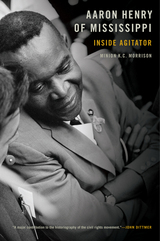2 books about 1922-1997

Aaron Henry of Mississippi
Inside Agitator
Minion K. C. Morrison
University of Arkansas Press, 2015
Winner of the 2016 Lillian Smith Book Award
When Aaron Henry returned home to Mississippi from World War II service in 1946, he was part of wave of black servicemen who challenged the racial status quo. He became a pharmacist through the GI Bill, and as a prominent citizen, he organized a hometown chapter of the NAACP and relatively quickly became leader of the state chapter.
From that launching pad he joined and helped lead an ensemble of activists who fundamentally challenged the system of segregation and the almost total exclusion of African Americans from the political structure. These efforts were most clearly evident in his leadership of the integrated Mississippi Freedom Democratic Party delegation, which, after an unsuccessful effort to unseat the lily-white Democratic delegation at the Democratic National Convention in 1964, won recognition from the national party in 1968.
The man who the New York Times described as being “at the forefront of every significant boycott, sit-in, protest march, rally, voter registration drive and court case” eventually became a rare example of a social-movement leader who successfully moved into political office. Aaron Henry of Mississippi covers the life of this remarkable leader, from his humble beginnings in a sharecropping family to his election to the Mississippi house of representatives in 1979, all the while maintaining the social-change ideology that prompted him to improve his native state, and thereby the nation.
When Aaron Henry returned home to Mississippi from World War II service in 1946, he was part of wave of black servicemen who challenged the racial status quo. He became a pharmacist through the GI Bill, and as a prominent citizen, he organized a hometown chapter of the NAACP and relatively quickly became leader of the state chapter.
From that launching pad he joined and helped lead an ensemble of activists who fundamentally challenged the system of segregation and the almost total exclusion of African Americans from the political structure. These efforts were most clearly evident in his leadership of the integrated Mississippi Freedom Democratic Party delegation, which, after an unsuccessful effort to unseat the lily-white Democratic delegation at the Democratic National Convention in 1964, won recognition from the national party in 1968.
The man who the New York Times described as being “at the forefront of every significant boycott, sit-in, protest march, rally, voter registration drive and court case” eventually became a rare example of a social-movement leader who successfully moved into political office. Aaron Henry of Mississippi covers the life of this remarkable leader, from his humble beginnings in a sharecropping family to his election to the Mississippi house of representatives in 1979, all the while maintaining the social-change ideology that prompted him to improve his native state, and thereby the nation.
[more]

Pogiebait's War
A Son's Quest for His Father's Wartime Life
Jack H. McCall
University of Tennessee Press, 2022
Jack H. McCall Sr. was a born storyteller, an inveterate practical joker, and a proud Tennessean whose flaws included a considerable taste for candy, or “pogiebait” in Marine parlance. Like so many other able-bodied young people in on the eve of World War II, he decided to enlist in the wake of the Japanese attack on Pearl Harbor. Much more than a family memoir or nostalgic wartime reminiscence, this painstakingly researched biography presents a rich, engaging study of the U.S. Marine Corps, particularly McCall’s understudied unit, the Ninth Defense Battalion—the “Fighting Ninth.” The author provides a window into the day-to-day service of a Marine during World War II, with important coverage of fighting in the Pacific Theater. McCall also depicts life in wartime Franklin, Tennessee, and offers a poignant and personal tribute to his father.
McCall dramatizes some of the classic themes of the war memoir genre (war is hell, but memories fade!), but he sets riveting descriptions of decisive action against rarely seen views of mundane work and daily life, supported with maps, photographs, and fresh interpretations. Another distinction of this work is its attention to the action on Guam, a very unpleasant late-war “mopping up” that has received relatively little scholarly attention. In his portrait of the bitter island-hopping war in the Pacific, the author shows how both U.S. and Japanese soldiers were often eager innocents drawn to the cauldron of conflict and indoctrinated and trained by their respective governments. Reflecting on the action late in life, Jack (as well as several other Ninth veterans) came to a begrudging respect for the enemy.
McCall dramatizes some of the classic themes of the war memoir genre (war is hell, but memories fade!), but he sets riveting descriptions of decisive action against rarely seen views of mundane work and daily life, supported with maps, photographs, and fresh interpretations. Another distinction of this work is its attention to the action on Guam, a very unpleasant late-war “mopping up” that has received relatively little scholarly attention. In his portrait of the bitter island-hopping war in the Pacific, the author shows how both U.S. and Japanese soldiers were often eager innocents drawn to the cauldron of conflict and indoctrinated and trained by their respective governments. Reflecting on the action late in life, Jack (as well as several other Ninth veterans) came to a begrudging respect for the enemy.
[more]
READERS
Browse our collection.
PUBLISHERS
See BiblioVault's publisher services.
STUDENT SERVICES
Files for college accessibility offices.
UChicago Accessibility Resources
home | accessibility | search | about | contact us
BiblioVault ® 2001 - 2024
The University of Chicago Press









